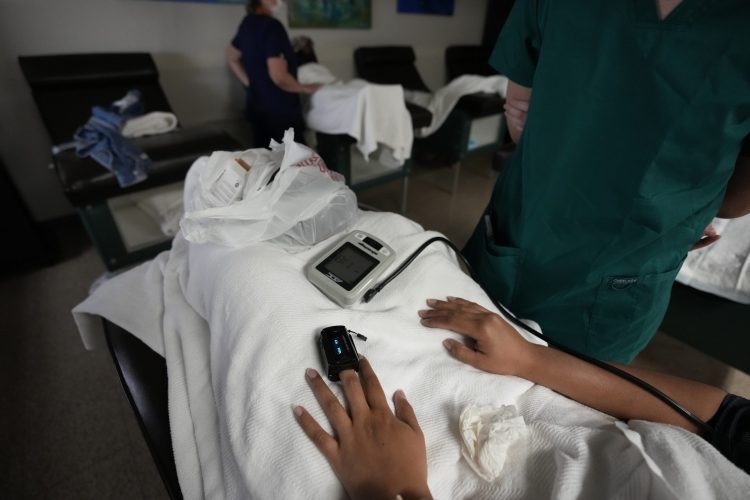Editor’s note: This story led off this week’s Higher Education newsletter, which is delivered free to subscribers’ inboxes every other Wednesday with trends and top stories about early learning. Subscribe today!
Emily Thompson was working in a convenience store in rural Maine two years ago when she met someone who changed her life.
Thompson, then 47, had recently reentered the workforce as a cashier after raising her child. A woman came into the store, worried about getting gas into her car because she had forgotten her wallet. As she helped the woman with the electronic payment app on her smartphone, she noticed her name tag: Pilar Burmeister, director of the nursing program at Eastern Maine Community College.
“Can you really get an R.N. from a community college?” Thompson recalls asking her.
Yes, she could. Not only that, she wouldn’t need to travel into the city to do it.
The nursing program at the Eastern Maine Community College in Bangor, Maine, partners with rural hospitals to provide nursing education close to home for students who would rather not come into the city. Now in its sixth year, the program is helping the community college increase enrollment in a job that’s in great demand. And it is reaching students who might otherwise struggle with transportation costs (especially during a period of epically high gas prices), family responsibilities or just a preference for staying close to home.
“It is a need in this community, and I want to work in the community where I live.”
Katie Eastman, nursing student at Northern Light Maine Coast Hospital, Ellsworth, Maine
“It’s a win-win for everybody,” Burmeister said. “We get to increase our rolls. Hospitals win because they get nurses. Students win on saving time and money.”
Nationwide, hospitals are grappling with major staffing shortages. To get enough nurses to care for patients, hospitals have been shelling out extraordinary sums to travel nurses. The situation is dire in rural hospitals, which have a smaller local population to draw from and have historically struggled to recruit people to work in the more remote regions.
Eastern Maine Community College currently enrolls students who do their clinical rotations, lab work and remote coursework in three rural hospitals, and work is underway to bring the program to additional communities. The Eastern Maine staff is also helping Washington County Community College. That college, in a remote region near the Canada border, does not have a nursing program, but the model Eastern Maine developed to partner with rural hospitals will help Washington County bring nursing education to the most northern reaches of the state.
This rural focus helps community colleges train more people who are likely to stick around in the rural hospital after they graduate.
Related: She has the heart of a nurse, but can she overcome obstacles to her degree?
So far, most of the nurses being trained by Eastern Maine are staying in the rural hospitals that they are paired with for clinicals. It’s already saving money for hospitals. For instance, Northern Light Mayo Hospital in Dover-Foxcroft, Maine, graduated six students in the class in 2020 and five are now working there, Burmeister said. In the first nine months after their graduation, she said, that saved the hospital $360,000 in travel nursing costs.
The locally recruited nurses also get a benefit. The hot job market means they likely will have a job offer in hand as soon as they graduate, for a job that pays a good wage and benefits. And it’s a chance for local people to serve their family and friends.
“It is a need in this community,” said Katie Eastman, a student who is paired with the Northern Light Maine Coast Hospital in Ellsworth, Maine, “and I want to work in the community where I live.”
“It’s a win-win for everybody. We get to increase our rolls. Hospitals win because they get nurses. Students win on saving time and money.”
Pilar Burmeister, director, nursing program, Eastern Maine Community College
The students do their clinical work and labs in the local hospital they are paired with for the duration of the two-year program. A nurse in the local hospital works for the community college to oversee the clinical work. Students take their classes online, meeting together as a local cohort in their community and Zooming in, so to speak, to watch a live class together that is happening in Bangor. The local nurse paired with the cohort is also at the Zoom class, so she can help answer questions and better connect the classwork to the hands-on training.
Dyana Gallant, an adjunct nursing instructor for Eastern Maine and a staff nurse at Millinocket Hospital, said that of the four graduates of the program’s first year, three started working at the hospital. The local training also gives the students what amounts to a two-year job interview, allowing both employer and employee to get to know each other well. And when nurses go on to the job after graduation, the transition is smooth. They already know their co-workers and where to find supplies.
“It is a huge confidence booster,” Gallant said.
Related: When nurses are needed most, nursing programs aren’t keeping up with demand
The rural students must occasionally travel to Bangor for a few experiences that the community collage can’t facilitate locally, such as clinicals in in-patient psychiatric wards and obstetrics. But making that trip only a handful of times, as opposed to several times a week, makes a big difference for people who live in rural communities.
Transportation to nursing programs, which require affiliation with a hospital, can be a challenge for these students, who don’t get financial aid to pay for the kind of beating a car would take doing a long commute. Nearly 44 percent of Maine’s community colleges are located in places without access to public transportation, according to a study by the Seldin/Haring-Smith Foundation.
Finding a community college close to home was a game-changer for Thompson, who went to the city for a bachelor’s degree in English right after high school. She didn’t do much with that degree when she moved home to rural Maine. Now, she’s looking forward to May when she plans to graduate as an R.N. and leave her cashier days behind.
“It is going to be a bit of a new lease on life for me,” Thompson said. “I wasn’t making a bunch of money at the store. I liked working there. But this is a real career for me.”
This story about nursing training was produced by The Hechinger Report, a nonprofit, independent news organization focused on inequality and innovation in education. Sign up for the Hechinger newsletter.
Related articles
The Hechinger Report provides in-depth, fact-based, unbiased reporting on education that is free to all readers. But that doesn’t mean it’s free to produce. Our work keeps educators and the public informed about pressing issues at schools and on campuses throughout the country. We tell the whole story, even when the details are inconvenient. Help us keep doing that.
Source by hechingerreport.org










